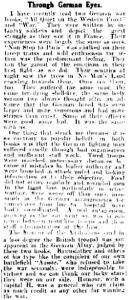Western Mail, Thursday, 22 August 1929, p. 2
Through German Eyes.
I have recently read two German war books, "All Quiet on the Western Front" and "War." They were written by infantry soldiers and depict the great struggle as they saw it in France. Their experiences were largely the same as ours. "Non Stop to Paris" wan chalked on their troop trains and wild enthusiasm for action was the predominant feeling. They ran the gamut of the emotions in their first fight as we did. Their sentries at night saw the trees in No Man's Land crawling towards them. Ours saw them too. They suffered the same mud, the same terrifying shell-fire, the same body vermin (we always thought after an advance that the German breed was even larger and more venomous and had more stripes than ours). Some of their officers were good, some bad. lt was the same with us.
One thing that struck me (because it is so contrary to popular belief) in both books was that the German fighting man suffered cruelly through bad organisation and inefficient staff work. Tired troops wore marched unnecessary distances because of mistakes by higher authority and were launched in attack unfed and lacking information as to their objective. Food did not arrive regularly and wounded men in the front line, particularly in active warfare, Were worse off than ours, inasmuch as the German arrangements for conveyance from line to hospital were badly coordinated. A real antagonism growing as the war went on was in evidence between front-line troops and their staff administrators at the base.
The humour of the Australians (and in a less degree the British troops) was not apparent in the German Army, judged by these two books. Bairnsfather and others of his type like the compilers of our own battlefield "Aussie," who refused to take the war seriously, were indispensable to victory and we can thank our lucky stars they were on our side. Humour, with a capital "H," was a general who can claim as much credit as any other for winning the war.







